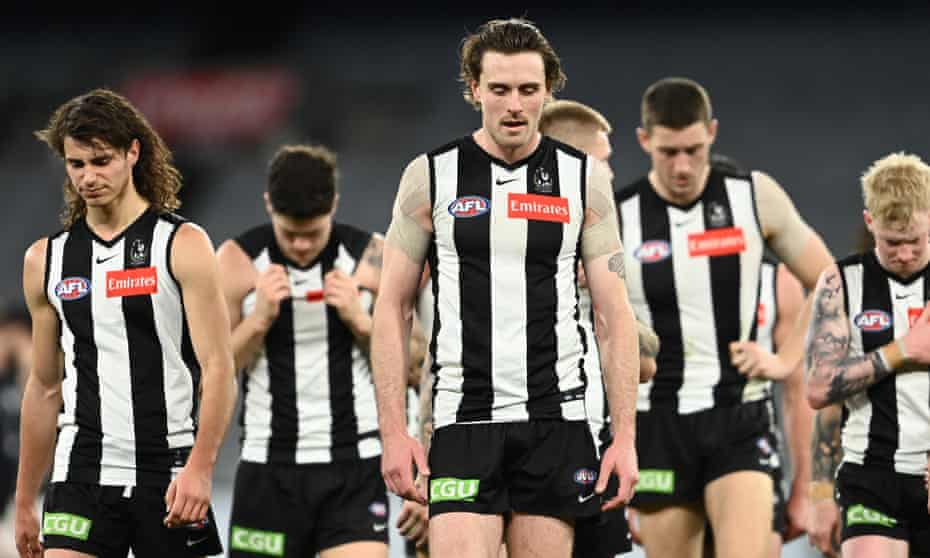As AFL footballers we’re using our platforms to inspire change on climate – a subject we care deeply about
People say they don’t want to be lectured to by professional athletes, but we’re not trying to school anyone on the science

Global warming, climate change, the climate crisis. What you call it evokes different reactions. Whether it stirs desperation, fear, passion or scepticism, the impact on the environment remains the same. By now, we’re well acquainted with these expressions and are entirely unsurprised by scientific reports proclaiming the irreversible damage our way of living has had on the natural world.
Primarily the result of the burning of fossil fuels, this harm has led to an increase in the frequency and severity of extreme weather events which, among other things, has disrupted sports across the globe. It’s no longer a problem for future generations. The world has run out of time while waiting for an uncomfortable humanity to face up to a ruinous reality of our own making. This is happening now.
Former Australian international netballer Amy Steel’s career was ended prematurely in 2016 due to permanent health damage resulting from heat stroke. England cricket captain Joe Root was admitted to hospital after batting through a 47C day during the 2018 Ashes Test match in Sydney.
The Australian Open updated its heat policy, including a heat-stress policy, to ensure the well-being of athletes on court in 2018. Smoke haze resulting from the 2019-20 Black Summer bushfires forced postponements of tennis matches and saw Australian cricketer Peter Siddle treated for smoke inhalation after a Big Bash League match was abandoned, while AFL and AFLW preseason training sessions were cancelled or forced indoors.
The reality is that most professional sports leagues and teams have enough financial backing to absorb the impacts of postponing, cancelling, or shifting games due to extreme weather events. It’s community clubs and junior leagues which will suffer most when things get worse. The impact of climate change on sport will continue to worsen if we don’t act. But that’s just a small part of why this means a great deal to me, and why I continue to speak about it publicly.
Climate change affects all of us and is only going to become a larger part of how we exist in the future. If you’ve changed the way you or your loved ones live due to heat – kept your children inside during heat waves or been called off work at a job site – you’ve already been impacted. And if you followed advice and stayed indoors to avoid the same smoke haze that impacted the tennis, cricket and AFL pre-season trainings, you’ve been impacted too. We can’t simply shrug things off as being part of a traditional “Aussie summer”, or as just being “temperamental Melbourne weather”.
On field, I’ve noticed a greater sense of camaraderie between AFL teams and players in recent times. I attribute some of that to the shared experience of the interrupted 2020 season. Living in Covid quarantine hubs brought us closer in many respects. It was in Twin Waters on the Sunshine Coast where my former teammate and good friend Tom Campbell and Jasper Pittard, both then at North Melbourne, began discussing their mutual concern around climate change and what our role, as AFL players, could be in working towards positive action.
Part of the issue with climate change for those who aren’t already passionate about it is that the subject can seem so overwhelming. So, Tom and Jasper started where it was most personal to them – the AFL.
That off-season they called me and asked whether I wanted to be involved in a group they were starting that would represent AFL and AFLW players who wanted their industry to make sustainability a priority. I enthusiastically said yes. In the 12-months since, more than 260 players have joined AFL Players For Climate Action (AFLP4CA).
In the past, players have been hesitant to speak up about issues with political implications. Particularly those who may not be viewed as superstars of the game. We’re told to stay in our lane or worry about getting a kick. In regard to climate specifically, it’s often “stop flying around the country to play games”.
People say they don’t want to be lectured to by footballers, but we aren’t trying to school anyone on the science. We’re simply attempting to use our platforms to inspire positive change, on a subject we really care about. With the backing of so many players – from both the AFL and AFLW, including best and fairest winners, premiership players and All-Australians – the AFLP4CA collective demonstrates how important this issue is to so many of us.
As a group representing a large number of players, we have many objectives. We want to help each other make changes on an individual level. But for many of us we also want to help out at our clubs, ensuring our ecological footprint is a prioritised consideration. We want to help the league take responsibility for its emissions. That’s why as our first project we’ve partnered with Go Neutral to enable players to contribute to Australian bushland regeneration by off-setting their annual AFL related travel emissions.
And we want our government to commit more strongly to renewable energy, and to cutting carbon emissions by 50% by 2030 and to reach net-zero before 2050. We want our leaders to attend global summits where actions to safeguard the environment for future generations will be discussed and decided. More than anything, we want kids to grow up playing the sport we love, in a system that could actually help, not harm, the world around them.
-
Jordan Roughead is an AFL player who has appeared in 200 games for Collingwood and the Western Bulldogs. He was part of the Bulldogs’ premiership team in 2016.